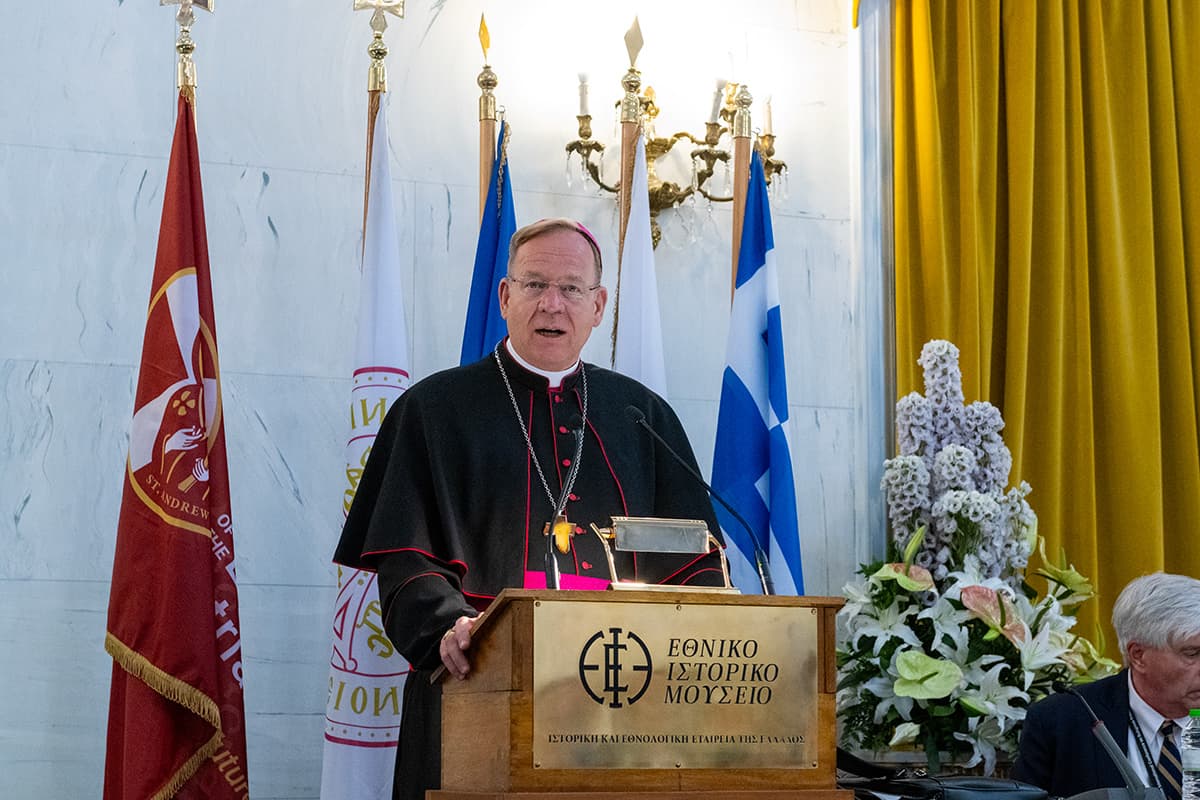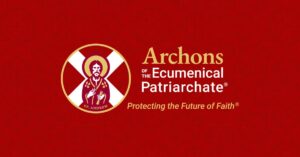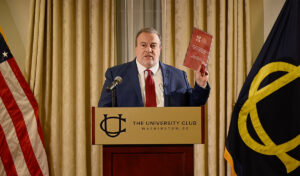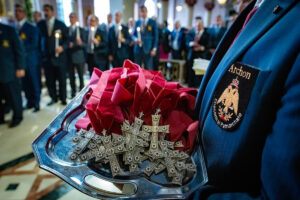Before the First Session of the 4th Archon International Conference on Religious Freedom began at the National Historical Museum in Athens on Monday, May 27 in the old parliament hall, Dr. Anthony J. Limberakis, National Commander of the Archons of the Ecumenical Patriarchate, made a momentous announcement: the recipient of the 2024 Athenagoras Human Rights Award will be Yulia Navalya, the widow of the martyred Russian dissident Alexei Navalny, and now the leader of the Russian opposition in her own right.
The session Convener, Archon George C. Rockas, Esq., spoke of how each of the Archons’ conferences on religious freedom had had their own particular character, and encouraged conference attendees to watch the videos of the previous conferences. He quoted a passage from Charles Dickens’ famed novel Bleak House: “I only ask to be free. The butterflies are free. Mankind will surely not deny to Harold Skimpole what it concedes to the butterflies.”
The keynote speaker was His Excellency Gintaras Grušas, Roman Catholic Archbishop of Vilnius and President of the Council of European Bishops’ Conferences (CCEE). He stated that the topic of the session, “Democracy, Authoritarianism and The Implications (Challenges and Opportunities) for Faith Communities Worldwide” struck at the heart of pressing issues today, and that democratic principles play a vital role in safeguarding rights for all. The sobering reality of authoritarianism, he said, brings challenges. It also provides an opportunity for faith communities to work together to confront authoritarianism and defend the rights of individuals.
Archbishop Grušas called upon Conference attendees to draw inspiration from the principles of human rights, as well as from religious principles. This coincided with what His All-Holiness Ecumenical Patriarch Bartholomew had stated at the Official Opening of the Conference that morning: that the UN’s Universal Declaration of Human Rights contained principles that all who are committed to human rights and religious freedom should accept.
Religious freedom, said Archbishop Grušas, stems from the inherent dignity of every human being. He noted that the document Dignitatis Humanae of the Roman Catholic Church’s Second Vatican Council stated that the dignity of the human person was intrinsic, and not based on external circumstances. He noted that the Holy and Great Council of the Orthodox Church (Crete, 2016) likewise called for full recognition of religious freedom, which is a component of the dignity of the human person.
His Excellency spoke in detail about the second-century Epistle to Diognetus, in which Christians are described as a unique community in society, called to be ambassadors of reconciliation. Yet in autocratic societies, he said, faith communities face significant challenges. Autocratic governments, he said, try to co-opt faith communities to legitimize themselves. He also warned that in democratic societies, religious groups can be co-opted for political ends. In autocratic societies, the steadfastness of people of faith can give hope to the oppressed, while in democratic societies, the challenge is that the truth is often seen as purely subjective and personal. He emphasized that Christians must resist the corruption of power and remain steadfast in witness to God who is love.
Archon William J. Antholis, PhD, Director and CEO of the Miller Center of Public Affairs at the University of Virginia, then asked His Excellency a series of questions, particularly about his own journey and personal experience with the deprivation of religious freedom. Following these, Archbishop Grušas also answered questions from the audience. In response to one question, he spoke movingly about how his parents were forcibly separated for sixteen years when his father was able to escape from the Soviet Union but his mother remained trapped behind the Iron Curtain.
Archbishop Grušas also spoke of the firsthand experience of the people of Lithuania with Russian occupation and oppression, and stated that Russia will keep advancing until it is stopped. He drew an analogy to Adolf Hitler’s expansionist moves in the run-up to World War II. In response to another question, he stated that he did not believe that the Roman Catholic Church and other Orthodox Churches were scared to criticized the Moscow Patriarch Kirill’s partnership with Putin. He stated that their silence in the face of the Moscow Patriarch’s endorsement of Russia’s war against Ukraine stemmed in the Vatican’s case from a desire to act as a mediator between the belligerent parties.
His Excellency also spoke about Christian/Islamic relations, emphasizing that, as Pope Francis has stated, there is no justification for terrorism and violence in the name of God. He noted the peaceful Muslims who revere mercy as one of the names of God.
In conclusion, Archbishop Grušas warned against going to extremes, either of excessive innovation or excessive traditionalism.
At the conclusion of the well-received and thought-provoking event, Archbishop Grušas was awarded with the crystal obelisk that was given to all speakers as a token of gratitude.





